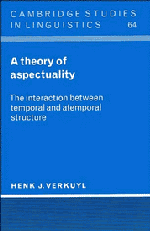Book contents
- Frontmatter
- Contents
- Preface
- Acknowledgments
- PART I ISSUES OF COMPOSITIONALITY
- PART II NOUN PHRASE STRUCTURE
- PART III TEMPORAL STRUCTURE
- 9 Homogeneity
- 10 Localism and additive structure
- 11 Event semantics and aspect construal
- 12 Aspect and perspective
- 13 Event construal
- 14 Testing the Plus-principle
- Conclusion to Part III
- Notes
- References
- Index
13 - Event construal
Published online by Cambridge University Press: 05 July 2011
- Frontmatter
- Contents
- Preface
- Acknowledgments
- PART I ISSUES OF COMPOSITIONALITY
- PART II NOUN PHRASE STRUCTURE
- PART III TEMPORAL STRUCTURE
- 9 Homogeneity
- 10 Localism and additive structure
- 11 Event semantics and aspect construal
- 12 Aspect and perspective
- 13 Event construal
- 14 Testing the Plus-principle
- Conclusion to Part III
- Notes
- References
- Index
Summary
Introduction
Chapter 13 has three goals. The first one is comparable with the goal of chapter 3.1: to introduce machinery and explain some basic technical type-logical notions for those readers who may find it convenient to go through it in order to refresh their logical memory. This will be done in section 13.1. This goal has been combined with the need to justify each step formally. This is necessary because the EL-logic which has been employed up to now will be extended with some intensional rules. In many formal semantic analyses, intensionality is given by making use of the rules of IL, the intensional logic used in Montague's PTQ. However, the plug-grammar of chapter 7.3 will only be partially intensionalized and not by IL-rules but rather by rules of the system called Ty2. As IL and Ty2 can be translated into each other, I will first introduce the relevant EL-rules, and then make a transition to the more generally formulated two-sorted logic Ty2, which has become increasingly standard because it turns out to be an easier language to work with, especially in the GQT direct representation of plug. In section 13.2 the second goal becomes visible: making a weak intensional version of plug on the basis of Ty2, that is, a version which is intensionally weaker than Ty2. This is to say that we do not need the full intensional capacity of IL and Ty2 to deal with the varied forms of index-dependency discussed in chapter 12.
Information
- Type
- Chapter
- Information
- A Theory of AspectualityThe Interaction between Temporal and Atemporal Structure, pp. 283 - 328Publisher: Cambridge University PressPrint publication year: 1993
